精品-高中英语语法通霸-4.形容词和副词比较级最高级常考点分类专项总结归纳讲解与高考真题详细练习题及答案
- 格式:doc
- 大小:590.00 KB
- 文档页数:7
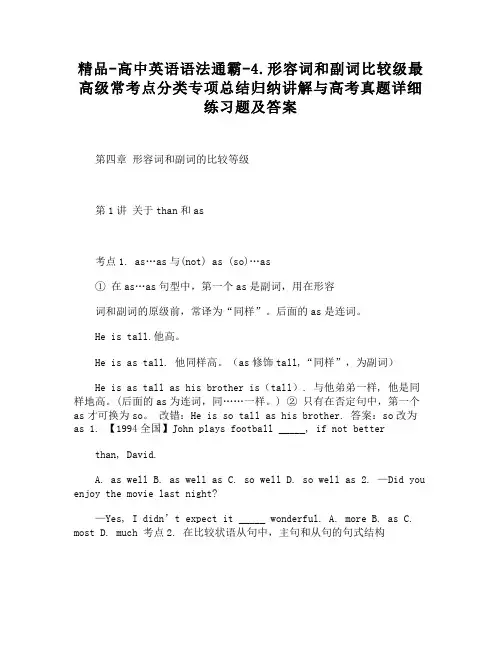
精品-高中英语语法通霸-4.形容词和副词比较级最高级常考点分类专项总结归纳讲解与高考真题详细练习题及答案第四章形容词和副词的比较等级第1讲关于than和as考点1. as…as与(not) as (so)…as① 在as…as句型中,第一个as是副词,用在形容词和副词的原级前,常译为“同样”。
后面的as是连词。
He is tall.他高。
He is as tall. 他同样高。
(as修饰tall,“同样”,为副词)He is as tall as his brother is(tall). 与他弟弟一样, 他是同样地高。
(后面的as为连词,同……一样。
) ② 只有在否定句中,第一个as才可换为so。
改错:He is so tall as his brother. 答案:so改为as 1. 【1994全国】John plays football _____, if not betterthan, David.A. as wellB. as well asC. so wellD. so well as 2. —Did you enjoy the movie last night?—Yes, I didn’t expect it _____ wonderful. A. more B. as C. most D. much 考点2. 在比较状语从句中,主句和从句的句式结构一般是相同的与as…as句式中后一个as一样,than也是连词。
as和than这两个连词后面的从句的结构与前面的句子结构相同,相同部分可以省略。
3. —What do you think of the plan?—It’s easier said than ______.A. carried out C. carry outB. carrying out D. to carry out4. To answer correctly is more important than ______.A. that you finish quicklyB. finishing quicklyC. to finish quicklyD. finish quickly 考点3. 谓语的替代(参看P. 错误!未定义书签。
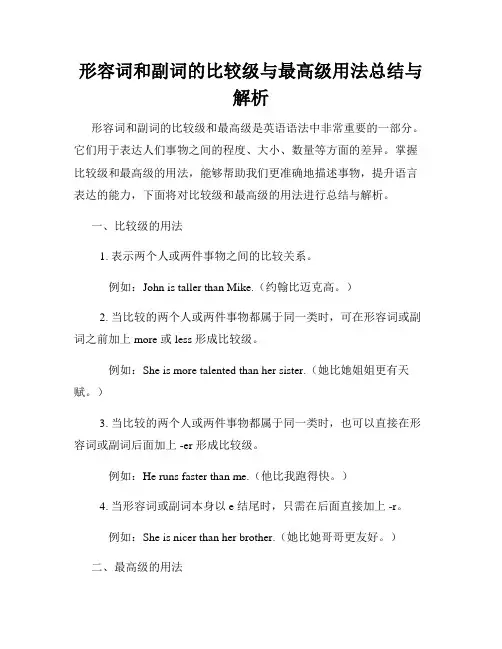
形容词和副词的比较级与最高级用法总结与解析形容词和副词的比较级和最高级是英语语法中非常重要的一部分。
它们用于表达人们事物之间的程度、大小、数量等方面的差异。
掌握比较级和最高级的用法,能够帮助我们更准确地描述事物,提升语言表达的能力,下面将对比较级和最高级的用法进行总结与解析。
一、比较级的用法1. 表示两个人或两件事物之间的比较关系。
例如:John is taller than Mike.(约翰比迈克高。
)2. 当比较的两个人或两件事物都属于同一类时,可在形容词或副词之前加上 more 或 less 形成比较级。
例如:She is more talented than her sister.(她比她姐姐更有天赋。
)3. 当比较的两个人或两件事物都属于同一类时,也可以直接在形容词或副词后面加上 -er 形成比较级。
例如:He runs faster than me.(他比我跑得快。
)4. 当形容词或副词本身以 e 结尾时,只需在后面直接加上 -r。
例如:She is nicer than her brother.(她比她哥哥更友好。
)二、最高级的用法1. 表示三个或三个以上人或事物之间的比较关系。
例如:He is the tallest among all the students.(他是全班同学中最高的。
)2. 当比较的三个或三个以上人或事物都属于同一类时,可在形容词或副词之前加上 most 或 least 形成最高级。
例如:It's the most beautiful place I have ever seen.(那是我见过的最美的地方。
)3. 当比较的三个或三个以上人或事物都属于同一类时,也可以直接在形容词或副词后面加上 -est 形成最高级。
例如:This is the fastest car in the world.(这是全世界最快的车。
)4. 如果形容词或副词本身以辅音字母 + y 结尾,则将 y 变为 i,再加上 -est。

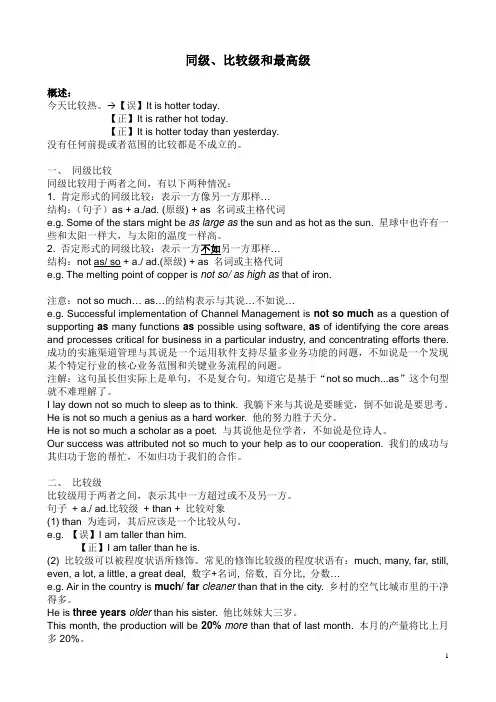
同级、比较级和最高级概述:今天比较热。
→【误】It is hotter today.【正】It is rather hot today.【正】It is hotter today than yesterday.没有任何前提或者范围的比较都是不成立的。
一、同级比较同级比较用于两者之间,有以下两种情况:1. 肯定形式的同级比较:表示一方像另一方那样…结构:(句子)as + a./ad. (原级) + as 名词或主格代词e.g. Some of the stars might be as large as the sun and as hot as the sun. 星球中也许有一些和太阳一样大,与太阳的温度一样高。
2. 否定形式的同级比较:表示一方不如另一方那样…结构:not as/ so + a./ ad.(原级) + as 名词或主格代词e.g. The melting point of copper is not so/ as high as that of iron.注意:not so much… as…的结构表示与其说…不如说…e.g. Successful implementation of Channel Management is not so much as a question of supporting as many functions as possible using software, as of identifying the core areas and processes critical for business in a particular industry, and concentrating efforts there.成功的实施渠道管理与其说是一个运用软件支持尽量多业务功能的问题,不如说是一个发现某个特定行业的核心业务范围和关键业务流程的问题。
注解:这句虽长但实际上是单句,不是复合句。
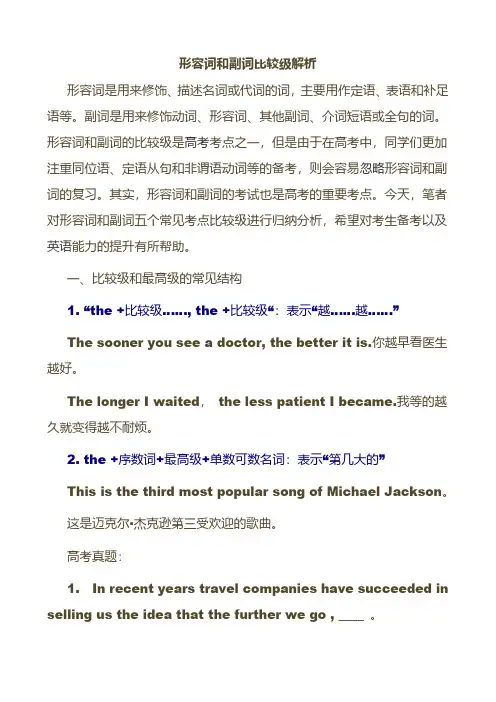
形容词和副词比较级解析形容词是用来修饰、描述名词或代词的词,主要用作定语、表语和补足语等。
副词是用来修饰动词、形容词、其他副词、介词短语或全句的词。
形容词和副词的比较级是高考考点之一,但是由于在高考中,同学们更加注重同位语、定语从句和非谓语动词等的备考,则会容易忽略形容词和副词的复习。
其实,形容词和副词的考试也是高考的重要考点。
今天,笔者对形容词和副词五个常见考点比较级进行归纳分析,希望对考生备考以及英语能力的提升有所帮助。
一、比较级和最高级的常见结构1. “the +比较级……, the +比较级“:表示“越……越……”The sooner you see a doctor, the better it is.你越早看医生越好。
The longer I waited,the less patient I became.我等的越久就变得越不耐烦。
2. the +序数词+最高级+单数可数名词:表示“第几大的”This is the third most popular song of Michael Jackson。
这是迈克尔·杰克逊第三受欢迎的歌曲。
高考真题:1. In recent years travel companies have succeeded in selling us the idea that the further we go , ____ 。
A. our holidays will be betterB. our holiday will be the betterC. the better our holiday will beD. the better will our holiday be2. As far as I am concerned, education is about learning and the more you learn, ____。
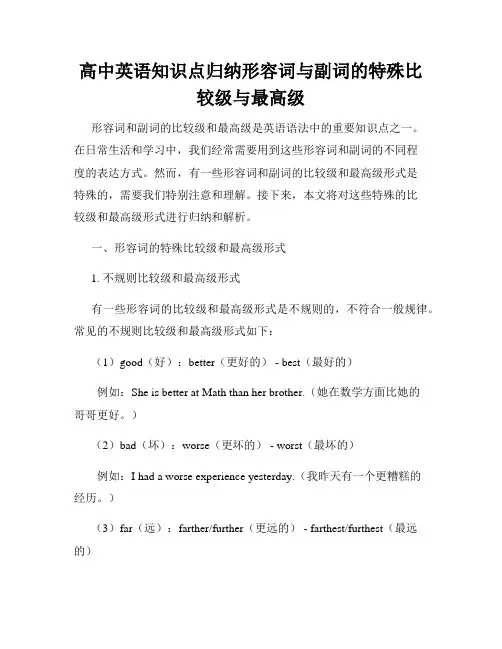
高中英语知识点归纳形容词与副词的特殊比较级与最高级形容词和副词的比较级和最高级是英语语法中的重要知识点之一。
在日常生活和学习中,我们经常需要用到这些形容词和副词的不同程度的表达方式。
然而,有一些形容词和副词的比较级和最高级形式是特殊的,需要我们特别注意和理解。
接下来,本文将对这些特殊的比较级和最高级形式进行归纳和解析。
一、形容词的特殊比较级和最高级形式1. 不规则比较级和最高级形式有一些形容词的比较级和最高级形式是不规则的,不符合一般规律。
常见的不规则比较级和最高级形式如下:(1)good(好):better(更好的) - best(最好的)例如:She is better at Math than her brother.(她在数学方面比她的哥哥更好。
)(2)bad(坏):worse(更坏的) - worst(最坏的)例如:I had a worse experience yesterday.(我昨天有一个更糟糕的经历。
)(3)far(远):farther/further(更远的) - farthest/furthest(最远的)例如:We walked farther than we expected.(我们走得比预期的要远。
)2. 辅音字母结尾的形容词比较级和最高级形式以一个辅音字母结尾的形容词,比较级和最高级形式要加上 -er 和 -est。
同时,要注意当辅音字母前只有一个元音字母时,要双写辅音字母。
例如:big(大)- bigger(更大的)- biggest(最大的)3. 重读闭音节结尾的形容词比较级和最高级形式对于重读闭音节结尾的形容词,比较级和最高级形式要双写末尾的辅音字母,并添加 -er 和 -est。
例如:hot(热)- hotter(更热的)- hottest(最热的)二、副词的特殊比较级和最高级形式1. 以 -ly 结尾的副词比较级和最高级形式以 -ly 结尾的副词,可以用 more 和 most 来构成比较级和最高级。
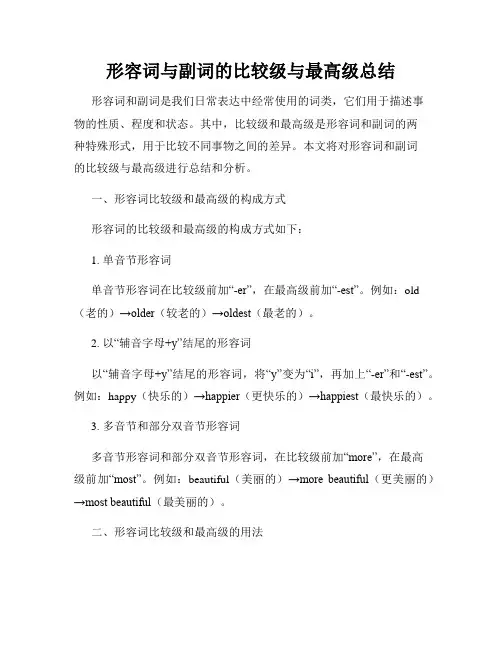
形容词与副词的比较级与最高级总结形容词和副词是我们日常表达中经常使用的词类,它们用于描述事物的性质、程度和状态。
其中,比较级和最高级是形容词和副词的两种特殊形式,用于比较不同事物之间的差异。
本文将对形容词和副词的比较级与最高级进行总结和分析。
一、形容词比较级和最高级的构成方式形容词的比较级和最高级的构成方式如下:1. 单音节形容词单音节形容词在比较级前加“-er”,在最高级前加“-est”。
例如:old (老的)→older(较老的)→oldest(最老的)。
2. 以“辅音字母+y”结尾的形容词以“辅音字母+y”结尾的形容词,将“y”变为“i”,再加上“-er”和“-est”。
例如:happy(快乐的)→happier(更快乐的)→happiest(最快乐的)。
3. 多音节和部分双音节形容词多音节形容词和部分双音节形容词,在比较级前加“more”,在最高级前加“most”。
例如:beautiful(美丽的)→more beautiful(更美丽的)→most beautiful(最美丽的)。
二、形容词比较级和最高级的用法形容词的比较级和最高级用于对两个或多个事物进行比较,揭示它们之间的差异。
1. 比较级的用法比较级表示两个事物之间的相对程度,用于比较两者之间的差异。
例如:He is taller than his brother.(他比他哥哥高。
)在比较级中,常使用than来连接进行比较的事物。
2. 最高级的用法最高级表示在同一类事物中达到顶点的程度。
例如:She is the smartest student in our class.(她是我们班最聪明的学生。
)在最高级中,常使用the来引导,并在形容词前加上定冠词the。
三、副词比较级和最高级的构成方式副词的比较级和最高级的构成方式与形容词相似,只是在单音节副词和部分双音节副词的最高级前添加"最"等修饰词。
例如:fast(快地)→faster(更快地)→fastest(最快地)。
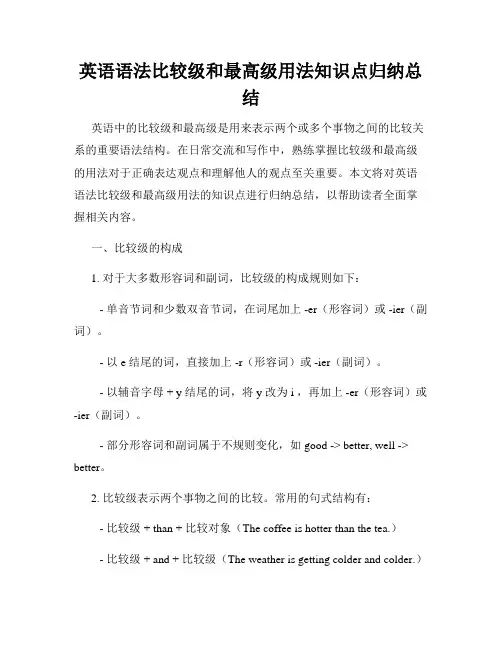
英语语法比较级和最高级用法知识点归纳总结英语中的比较级和最高级是用来表示两个或多个事物之间的比较关系的重要语法结构。
在日常交流和写作中,熟练掌握比较级和最高级的用法对于正确表达观点和理解他人的观点至关重要。
本文将对英语语法比较级和最高级用法的知识点进行归纳总结,以帮助读者全面掌握相关内容。
一、比较级的构成1. 对于大多数形容词和副词,比较级的构成规则如下:- 单音节词和少数双音节词,在词尾加上 -er(形容词)或 -ier(副词)。
- 以 e 结尾的词,直接加上 -r(形容词)或 -ier(副词)。
- 以辅音字母 + y 结尾的词,将 y 改为 i ,再加上 -er(形容词)或-ier(副词)。
- 部分形容词和副词属于不规则变化,如 good -> better, well -> better。
2. 比较级表示两个事物之间的比较。
常用的句式结构有:- 比较级 + than + 比较对象(The coffee is hotter than the tea.)- 比较级 + and + 比较级(The weather is getting colder and colder.)- more + 形容词 / 副词(More and more people are interested in learning English.)二、最高级的构成1. 对于大多数形容词和副词,最高级的构成规则如下:- 在比较级基础上加上 -est(形容词)或 -iest(副词)。
- 以 e 结尾的词,直接加上 -st(形容词)或 -iest(副词)。
- 以辅音字母 + y 结尾的词,将 y 改为 i ,再加上 -est(形容词)或 -iest(副词)。
- 部分形容词和副词属于不规则变化,如 good -> best, well -> best。
2. 最高级表示三个或三个以上事物之间的比较。
常用的句式结构有:- the + 最高级 + of + 比较对象(He is the tallest of all the students.) - 形容词 / 副词 + in / of + 最高级(She is the most beautiful girl inthe class.)- 形容词 / 副词 + of + all(It is the most expensive car of all.)三、比较级和最高级的用法1. 用于形容词和副词,表示大小、程度、数量等方面的比较。
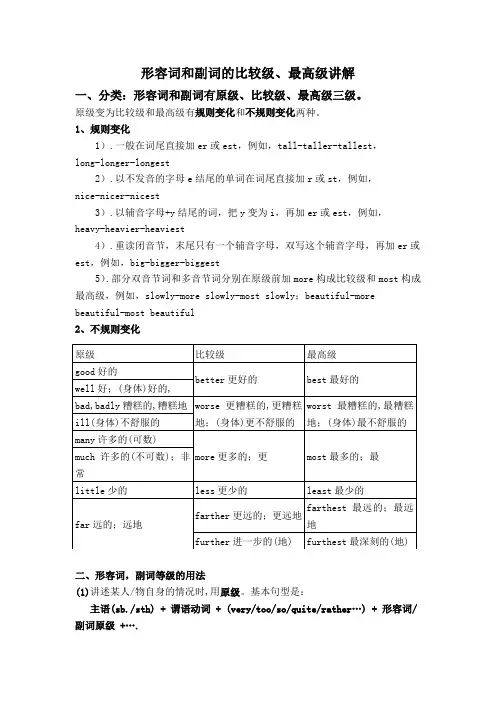
形容词和副词的比较级、最高级讲解一、分类:形容词和副词有原级、比较级、最高级三级。
原级变为比较级和最高级有规则变化和不规则变化两种。
1、规则变化1).一般在词尾直接加er或est,例如,tall-taller-tallest,long-longer-longest2).以不发音的字母e结尾的单词在词尾直接加r或st,例如,nice-nicer-nicest3).以辅音字母+y结尾的词,把y变为i,再加er或est,例如,heavy-heavier-heaviest4).重读闭音节,末尾只有一个辅音字母,双写这个辅音字母,再加er或est,例如,big-bigger-biggest5).部分双音节词和多音节词分别在原级前加more构成比较级和most构成最高级,例如,slowly-more slowly-most slowly;beautiful-more beautiful-most beautiful2、不规则变化二、形容词,副词等级的用法(1)讲述某人/物自身的情况时,用原级。
基本句型是:主语(sb./sth) + 谓语动词+ (very/too/so/quite/rather…) + 形容词/副词原级+….如:He is very old now.(他现在很老了) / They ran quite fast.(它们跑得相当快) / The weather looks rather bad.(天气看上去相当糟) / I am so happy!(我是如此的快乐)☆表示两者之间没有差别时,使用句型:主语(第一个人物) + 谓语动词 + as + 形容词/副词原级 + as + 第二个人物+….如:He is as excited as his younger sister.(他和他妹妹一样兴奋)/ Lily rode her bike as slowly as an old lady.(莉莉骑车像老太太一样慢)/ They picked as many apples as the farmers (did).(他们摘的苹果和农民一样多) ☆表示第一个人比不上第二个人时,使用句型:主语(第一个人物) + 谓语动词(否定式) + as / so + 形容词/副词原级 + as + 第二个人物+….如:He is not so / as excited as his younger sister.他没他妹妹那么兴奋Lily did not ride her bike so / as slowly as an old lady.莉莉骑车不像老太太那样慢They didn’t pick so / as many apples as the farmers (did).他们摘的苹果不如农民多(2) 讲述两者有差异,第一个人物超过第二个人物时,用比较级。
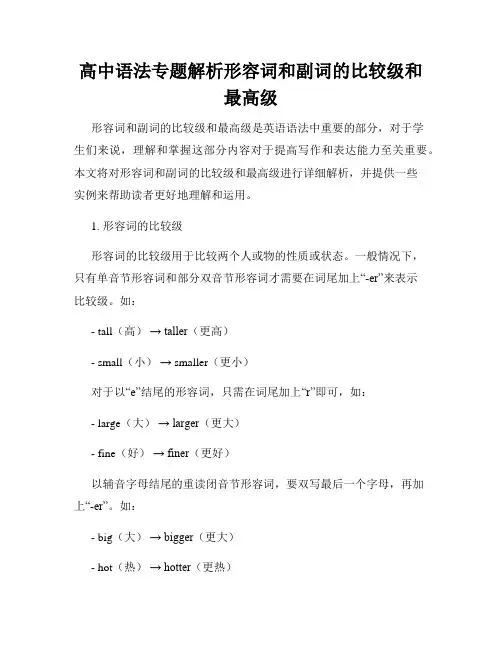
高中语法专题解析形容词和副词的比较级和最高级形容词和副词的比较级和最高级是英语语法中重要的部分,对于学生们来说,理解和掌握这部分内容对于提高写作和表达能力至关重要。
本文将对形容词和副词的比较级和最高级进行详细解析,并提供一些实例来帮助读者更好地理解和运用。
1. 形容词的比较级形容词的比较级用于比较两个人或物的性质或状态。
一般情况下,只有单音节形容词和部分双音节形容词才需要在词尾加上“-er”来表示比较级。
如:- tall(高)→ taller(更高)- small(小)→ smaller(更小)对于以“e”结尾的形容词,只需在词尾加上“r”即可,如:- large(大)→ larger(更大)- fine(好)→ finer(更好)以辅音字母结尾的重读闭音节形容词,要双写最后一个字母,再加上“-er”。
如:- big(大)→ bigger(更大)- hot(热)→ hotter(更热)对于部分双音节或多音节形容词,需要在形容词前加上“more”来表示比较级。
如:- interesting(有趣的)→ more interesting(更有趣的)- beautiful(美丽的)→ more beautiful(更美丽的)2. 形容词的最高级形容词的最高级表示三个或三个以上人或物在某一属性上的最高程度。
一般情况下,在形容词前加上“the”并在词尾加上“-est”来构成最高级。
如:- tall(高)→ the tallest(最高的)- small(小)→ the smallest(最小的)以“e”结尾的形容词只需在词尾加上“st”即可,如:- large(大)→ the largest(最大的)- fine(好)→ the fin est(最好的)以辅音字母结尾的重读闭音节形容词,在最后一个字母前双写后再加上“-est”。
如:- big(大)→ the biggest(最大的)- hot(热)→ the hottest(最热的)对于部分双音节或多音节形容词,需要在形容词前加上“the most”来表示最高级。
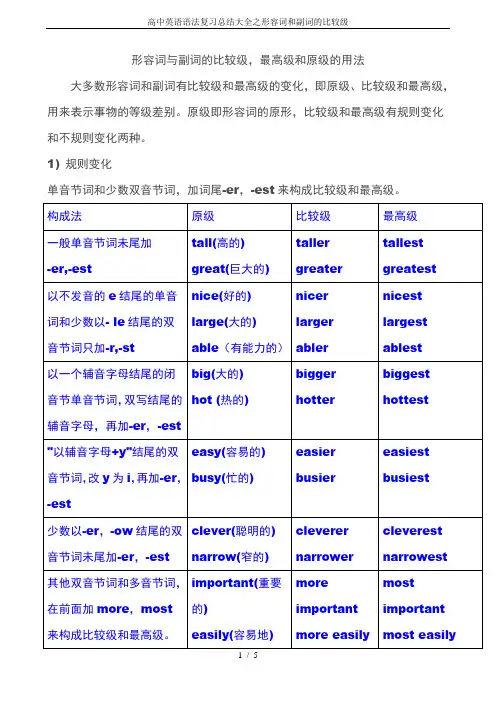
形容词与副词的比较级,最高级和原级的用法大多数形容词和副词有比较级和最高级的变化,即原级、比较级和最高级,用来表示事物的等级差别。
原级即形容词的原形,比较级和最高级有规则变化和不规则变化两种。
1) 规则变化单音节词和少数双音节词,加词尾-er,-est来构成比较级和最高级。
2) 不规则变化原级比较: as+形容词或副词原级+as1)在否定句或疑问句中可用so… as。
He cannot run so/as fast as you.2)当as… as 中间有名词时采用以下格式as +形容词+ a +单数名词\ as + many/much +名词This is as good an example as the other is.I can carry as much paper as you can..3)用表示倍数的词或其他程度副词做修饰语时,放在as的前面。
This room is twice as big as that one.Your room is the same size as mine.4)倍数表达法▲A is three(four, etc.)times the size(height, length etc.)of B.The new building is four times the size(the height)of the old one.这座新楼是那座旧楼的四倍大(高)/这座新楼比那座旧楼大(高)三倍。
▲A is three(four, etc.)times as big(high, long, etc.)as B.Asia is four times as large as Europe. 亚洲是欧洲的四倍大/亚洲比欧洲大三倍。
▲A is three (four, etc.)times bigger(higher, longer, etc.)than B.Your school is three times bigger than ours.你们的学校比我们的学校大三倍。
高中英语知识点归纳形容词与副词的比较级与最高级形容词与副词的比较级和最高级是英语语法中非常重要的知识点。
在日常语言交流和学术写作中,我们经常会用到这两种形式来表达事物之间的程度、大小、速度等差异。
本文将对形容词和副词的比较级和最高级进行细致的归纳和总结。
一、形容词比较级的构成1. 较短形容词:在形容词后面加上-er。
例如:smart- smarter(聪明-更聪明)、big- bigger(大-更大)2. 以“e”结尾的形容词:直接在形容词后面加-r。
例如:brave- braver(勇敢-更勇敢)、nice- nicer(好-更好)3. 以辅音字母+元音字母+辅音字母结尾的形容词:双写最后一个辅音字母再加-er。
例如:big- bigger(大-更大)、hot- hotter(热-更热)4. 较长的形容词:在形容词前面加more。
例如:beautiful- more beautiful(美丽-更美丽)、expensive- more expensive(贵-更贵)二、形容词最高级的构成1. 较短形容词:在形容词后面加上-est。
例如:smart- smartest(聪明-最聪明)、big- biggest(大-最大)2. 以“e”结尾的形容词:直接在形容词后面加-st。
例如:brave- bravest(勇敢-最勇敢)、nice- nicest(好-最好)3. 以辅音字母+元音字母+辅音字母结尾的形容词:双写最后一个辅音字母再加-est。
例如:big- biggest(大-最大)、hot- hottest(热-最热)4. 较长的形容词:在形容词前面加most。
例如:beautiful- most beautiful(美丽-最美丽)、expensive- most expensive(贵-最贵)三、副词比较级和最高级的构成1. 一般情况下,在副词前面加上more构成比较级,加上most构成最高级。
可编辑修改精选全文完整版形容词、副词的比较级与最高级用法详解一、形容词、副词比较级、最高级构成大多数的形容词、副词都具有原级、比较级和最高级三种形式。
而形容词、副词的比较级、最高级构成方式分规则变化和不规则变化。
其规则变化的方式详见下面个表:(一)规则变化:(1) 直接在词尾加-er, -est(2) 以不发音字母e 结尾的,在词尾加-r , -st(3)以“辅音字母+y“结尾的,把y 变i,再加-er , -est(4) 以辅音字母结尾的重读闭音节词汇,双写最后一个辅音字母,再加-er , -est(5) 部分双音节和多音节词,在其前加more, most(二)、不规则变化:比较级、最高级具有不规则变化形式的形容词和副词比较少,因此,需要大家逐一认真记忆。
详见下表:【妙记顺口溜】“坏”“病”两“多”和两“好”,一是“远”来,二是“老”,little 是“少”不是“小”。
二、形容词、副词比较级和最高级用法(一)形容词、副词比较级用法形容词、副词的比较级主要对两个的人或物在某种程度、性质上进行比较。
常见的形容词副词比较级用法如下:1.同级比较① A+be/v+as+原级+as+B A和B一样This room is as large as that one .这间房子和那间一样大(形容词)Tom writes as carefully as Kate.汤姆写字跟凯特一样认真。
(副词)②A+be/V+not+as(so)+级+as +B A 不如BTigers aren't as(so) dangerous as lions.老虎不如狮子危险。
(形容词)Mary didn't finish the work as(so) well as Lucy.玛丽完成这项工作不如露西好。
(副词)2.差极比较①A+be/v+比较级+B A比B更......This pen is newer than that one.这支钢笔比那支新。
高中英语知识点归纳形容词和副词的用法和辨析形容词和副词是英语中常见的词类,它们用于修饰名词或者动词,起到描述事物性质和程度的作用。
形容词通常用于修饰名词,而副词则用于修饰动词、形容词或者其他副词。
本文将对形容词和副词的用法和辨析进行归纳和阐述。
一、形容词的用法和辨析形容词是一种用来描述名词属性、特征或者状态的词类,它常常位于名词前面,用于修饰名词。
1. 形容词的比较级和最高级形容词有比较级和最高级两种变化形式,用于比较事物的大小、程度或者质量。
比较级的构成方式为“原形 + -er”,最高级的构成方式为“原形 + -est”。
例如:- 大(big)→更大(bigger)→最大(biggest)- 高(tall)→更高(taller)→最高(tallest)2. 形容词的修饰范围形容词的修饰范围通常是名词,它可以修饰单个名词,也可以修饰名词短语。
例如:- 单个名词修饰:a beautiful garden(一个美丽的花园)- 名词短语修饰:a girl with long hair(一个长发的女孩)3. 形容词的位置形容词通常位于名词之前,但也可以位于系动词后面作表语,或者位于疑问代词或不定代词之后。
例如:- 位于名词之前:a black cat(一只黑猫)- 作表语:The food is delicious.(这食物很好吃。
)- 位于疑问代词之后:Which car is yours?(哪辆车是你的?)二、副词的用法和辨析副词是一种修饰动词、形容词、副词或整个句子的词类,用于表示程度、方式、时间等。
1. 副词的分类副词可以分为程度副词、方式副词、时间副词、地点副词等多种类别。
- 程度副词:very、much、extremely等- 方式副词:slowly、carefully、well等- 时间副词:now、yesterday、soon等- 地点副词:here、there、everywhere等2. 副词的位置副词通常位于动词之前,形容词之后,或者句末。
英语形容词副词比较级和最高级用法区别归纳总结在英语语法中,形容词和副词的比较级和最高级是用来比较两个或多个事物在某个特定特征上的程度高低的。
正确掌握比较级和最高级的用法对于准确表达和交流意思至关重要。
本文将对英语形容词和副词的比较级和最高级用法进行归纳总结。
一、形容词比较级的用法1. 比较两者之间的程度:形容词比较级的结构是 "比较级 + than"。
例如:- She is taller than her sister.- This book is more interesting than that one.2. 比较多者之间的程度:形容词比较级的结构是 "the + 比较级 + of"。
例如:- He is the tallest of all the students.- This is the most delicious of all the cakes.3. 和某事物相比较的程度:形容词比较级的结构是 "比较级 + than + 某事物"。
例如:- The weather is colder today than yesterday.- The new car is faster than the old one.二、形容词最高级的用法1. 在三者或更多者之间进行比较:形容词最高级的结构是 "the + 最高级 + of"。
例如:- This is the smallest of all the boxes.- She is the most intelligent of all the students.2. 和某事物比较的程度:形容词最高级的结构是 "the + 最高级 + 某事物"。
例如:- He is the oldest in his family.- This is the most expensive car in the showroom.三、副词的比较级和最高级用法1. 比较两者之间的程度:副词比较级的结构是 "比较级 + than"。
形容词和副词的比较级和最高级形容词和副词的比较级和最高级的用法是初二上册新教材的重要考点,同时也是中考必须掌握的重要内容。
本文主要从形容词副词比较等级的变化、用法、及易错点三大方面对相关知识点进行详细解析,希望对同学们有所帮助。
一. 形容词和副词的比较级和最高级的变化方法如下:(1) 规则变化表:(2)几个不规则的形容词和副词的比较级和最高级如下表:二.形容词和副词比较级的基本用法注:如果动词是及物或不及物动词,则后面用副词;如果后面是连系动词,则后面用形容词。
如:This car is the fastest of the four.(形容词)(这辆汽车是四辆之中最快的) This car runs (the) fastest of the four.(副词)(这辆汽车是四辆之中跑得最快的)三.形容词副词比较级最高级的特殊用法(1)和冠词连用the +形容词原级+v(复),指一类人或物the + 形容词比较级,指两者中“较…的”的那一个,eg. the younger of the two a/ an +形容词比较级eg. The pen is expensive. I want a cheaper one. ( a) +most +形容词最高级 “非常…” eg. a most beautiful city (2)序数词与最高级连用,如:Flying is the fastest and the second cheapest way to travel. (3)比较级+than any other +n. (单) (适用于范围一致时)(all) other +n.(复)any +n.(单) (适用于范围不一致时) He is taller than any other student / all other students in his class. any student in my class. (4)倍数表达法。
形容词副词比较级最高级变化形式归纳超全形容词和副词是用来形容人、事物以及描述行为的词语,它们在使用时会出现比较级和最高级的形式。
掌握形容词和副词的变化形式对于我们准确表达自己的意思至关重要。
本文将全面归纳形容词和副词比较级最高级的变化形式,以帮助读者更好地理解和运用。
一、形容词的比较级和最高级变化形式1. 形容词一般情况下,在比较级前面加上"er",在最高级前面加上"est",如:positive(原级) comparative(比较级) superlative(最高级)small(小) smaller(较小) smallest(最小)tall(高) taller(较高) tallest(最高)2. 以辅音字母+y结尾的形容词,变y为i,再加"er"和"est",如:positive comparative superlativehappy(快乐) happier(更快乐) happiest(最快乐)funny(有趣) funnier(更有趣) funniest(最有趣)3. 以重读闭音节结尾且末尾只有一个辅音字母,双写这个辅音字母,再加"er"和"est",如:positive comparative superlativebig(大) bigger(更大) biggest(最大)hot(热) hotter(更热) hottest(最热)4. 以“e”结尾的形容词,直接加"r"和"st",如:positive comparative superlativewide(宽) wider(更宽) widest(最宽)nice(好) nicer(更好) nicest(最好)5. 部分形容词的比较级和最高级形式不规则,需记忆,如:positive comparative superlativegood(好) better(更好) best(最好)bad(差) worse(更差) worst(最差)far(远) farther(更远) farthest(最远)二、副词的比较级和最高级变化形式1. 大多数副词在比较级前面加上"er",在最高级前面加上"est",如:positive comparative superlativequickly(快速地) quicker(更快地) quickest(最快地)carefully(小心地) more carefully(更小心地) most carefully(最小心地)2. 以"e"结尾的副词,直接加"r"和"st",如:positive comparative superlativelate(晚地) later(更晚地) latest(最晚地)wide(宽地) wider(更宽地) widest(最宽地)3. 以辅音字母+y结尾的副词,变y为i,再加"er"和"est",如:positive comparative superlativeangrily(生气地) more angrily(更生气地) most angrily(最生气地)happily(快乐地) more happily(更快乐地) most happily(最快乐地)4. 部分副词的比较级和最高级形式不规则,需记忆,如:positive comparative superlativewell(好) better(更好) best(最好)badly(糟糕地) worse(更糟糕地) worst(最糟糕地)far(远地) farther/further(更远地) farthest/furthest(最远地)总结:形容词和副词的比较级和最高级形式变化多样,有规律的也有不规律的,但是通过记忆和练习,我们可以更好地运用它们来准确描述事物和行为。
第四章形容词和副词的比较等级第1讲关于than和as考点1.as…as与(not) as (so)…as①在as…as句型中,第一个as是副词,用在形容词和副词的原级前,常译为“同样”。
后面的as是连词。
He is tall.他高。
He is as tall. 他同样高。
(as修饰tall,“同样”,为副词)He is as tall as his brother is(tall). 与他弟弟一样, 他是同样地高。
(后面的as为连词,同……一样。
)②只有在否定句中,第一个as才可换为so。
改错:He is so tall as his brother.答案:so改为as1.【1994全国】John plays football _____, if not betterthan, David.A. as wellB. as well asC. so wellD. so well as2.—Did you enjoy the movie last night?—Yes, I didn’t expect it _____ wonderful.A. moreB. asC. mostD. much考点2.在比较状语从句中,主句和从句的句式结构一般是相同的与as…as句式中后一个as一样,than也是连词。
as和than这两个连词后面的从句的结构与前面的句子结构相同,相同部分可以省略。
3.—What do you think of the plan?—It’s easier said than ______.A. carried outB. carrying outC. carry outD. to carry out4.To answer correctly is more important than ______.A. that you finish quicklyB. finishing quicklyC. to finish quicklyD. finish quickly考点3.谓语的替代(参看P. 错误!未定义书签。
错误!未找到引用源。
)在as和than引导的比较状语从句中,由于句式同前面主句相同,为避免重复,常把主句中出现而从句中又出现的动词用do的适当形式来代替。
如:John speaks German as fluently as Mary does.5.John gives me more help than ______.A. Tom isB. Tom hasC. Tom doesD. Tom gives6.I picked more apples than you ______ yesterday.A. pickedB. doC. didD. had7.【2007重庆】As I know, he spends at least as muchtime playing as he ______.A. writesB. does writingC. is writingD. does write第2讲比较级考点1.可以修饰比较级的词常用来修饰比较级的词或短语有:a bit, a little, rather, much, far, by far, a lot, a great deal, any, still, even等。
by far的用法:用于强调,意为“……得多”“最最……”“显然”等,可修饰形容词或副词的比较级和最高级,通常置于其后,但是若比较级或最高级前有冠词,则可置于其前或其后。
如:It’s quicker by far to go by train. 乘火车要快得多。
She ran fastest by far. 她跑得最快(显然她跑得最快)。
He’s by far the cleverer student.他是个聪明得多的孩子。
He is by far the best teacher.=He is the best teacher by far.他是最最好的老师(他显然是最好的老师)。
1.You are such a woman as always think _____ ofyourself than others.A. muchB. much moreC. littleD. much less2.【2004福建】The number of people present at theconcert was _____ than expected. There were many tickets left.A. much smallerB. much moreC. much largerD. many more3.—The novel is, I have to say, not a bit interesting.How do you find it?—Why! It’s _____ that I have ever read.A. a most interestingB. a more interestedC. a less interestingD. by far (答疑qq 329950885) the most interesting4.【2007 全国II】After two years’ research, we nowhave a _____ better understanding of the disease.A. veryB. farC. fairlyD. quite5.—The disease he suffers is not easy to cure.—I know, but is he _____ better?A. muchB. ratherC. anyD. little6.【2000上海】You’re standing too near the camera.Can you move _____?A. a bit farB. a little fartherC. a bit of fartherD. a little far7.【2006江苏】I wish you’d do_____ talking andsome more work. Thus things will become better.A. a bit lessB. any lessC. much moreD. a little more考点2.more、much与比较级more 放在多音节形容词和副词前构成比较级,如:more interesting, more exciting。
单音节词和部分双音节词在后面加-er构成比较级,如:taller, earlier, hotter。
much修饰比较级。
如:much more interesting, much taller。
而像much more taller /more taller是错误的。
8.【1991全国】The experiment was _____ easier thanwe had expected.A. moreB. much moreC. muchD. more much9.【1994全国】If there were no examinations, weshould have _____ at school.A. the happiest timeB. a more happier timeC. much happiest timeD. a much happier time考点3.比较级的否定形式表示最高级的意思有时比较级用于否定句时,可以表达最高级的意思。
10.Boris has brains. In fact, I doubt whether anyone inthe class has _____ IQ.A. a highB. a higherC. the higherD. the highest11.—What do you think of the service here?—Oh, _____. We couldn’t have found a better place.A. too badB. sorryC. wonderfulD. impossible12.【2010全国Ⅱ】Mr. Black is very happy because theclothes made in his factory have never been _____.A. popularB. more popularC. most popularD. the most popular13.【2011全国II】Mr. Stevenson is great to workfor—I really couldn’t ask for a _____ boss.A. betterB. goodC. bestD. still better14.【2011四川】—How is your recent trip to Sichuan?—I’ve never had _____ one before.A. a pleasantB. a more pleasantC. a most pleasantD. the most pleasant15.【2013浙江】I ______ myself more —it was aperfect day.A. shouldn’t have enjoyedB. needn’t have enjoyedC. wouldn’t have enjoyedD. couldn’t have enjoyed考点4.not +比较级与no +比较级no和比较级连用时,常表示它所修饰形容词或副词的相反的意思。
He is no taller than him.他比他高不到哪儿去。
(他和他一样矮)My English is no better than yours.我的英语比你的好不到哪儿去。
(一样差)16.—Can Li Hua help me with my English?—I regret to tell you her English is _____ yours.A. as good asB. no more thanC. no better thanD. as much as17.The technical college education is playing animportant part today and its role will be _____ important.A. no lessB. no moreC. none the lessD. not more18.—Is Mr. White out of danger?—No, _____ than before, I’m afraid.A. no betterB. a little betterC. not worseD. no worse考点5.less构成比较级19.She is _____ than her younger sister.A. less richerB. not more richC. less richD. not rich20.【2006北京】This washing machine isenvironmentally friendly because it uses _____ water and electricity than _____ models.A. less; olderB. less; elderC. fewer; olderD. fewer; elder考点6.“变得”后常跟比较级改错:Our world is getting small and small.解析:改为Our world is getting smaller and smaller.在这里,是指比原来更小,所以用比较级。